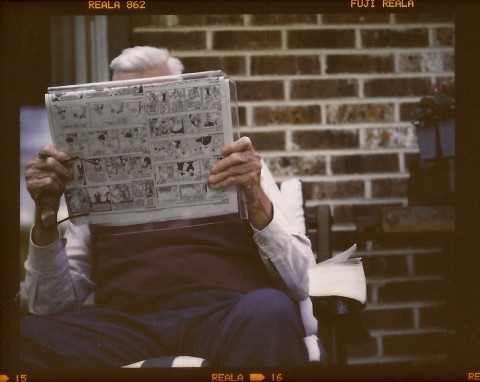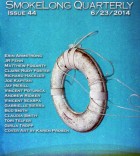None of us could figure out when exactly Annie’s father immigrated from Poland and the question of timing came to be a joke he wasn’t in on. We only knew it was sometime during the long bad time between the occupation and the roundtable. He carried messages for the Secret State during the war and after it changed his name and became a baker. Every time we’d drive down into the city, into Hamtramck to his small house for dinner, it’d be warm and there’d be the smell of fresh bread or paczkis and, at some point, he’d tell the story of where he was when Cardinal Wojtyla was elected Pope. Most times he’d call him “Cardinal” but other times it was “John Paul” or “John Paul II” or “His Holiness” or just “The Pope.” Once, after a few shots of his homemade quince nalewka, it was “Karol.” I remember that night because I made the mistake of repeating the familiar, calling the pope by his given name, and my father-in-law smacked me so hard I thought a crown fell out. Annie sat in the corner and laughed. She was also drunk.
But the story always started before dessert was served and it always started like this: “Every man and woman and child in Poland remembers where they were. You do this. You do this with your Kennedy, the day he was killed by that Soviet.” Sometimes, especially nights when he skipped dessert and instead just propped back into his dull yellow plaid La-Z-Boy, he’d digress into a full theory of the Kennedy assassination, about the Stalinists, about how the Kremlin could get to anyone anywhere. “I tell you I remember that summer. First it was Paul VI died. I think it was August. There was one John Paul they named and he died too. This news was big. Big news in 1978.” One time, I interrupted to tell him that was the year I turned thirteen, but he wouldn’t hear me—once the story got going, he wouldn’t ever stop. “I was here in Detroit, down the street from this very house. That year we opened the bakery. It was cold. All the people, they were saying the new pope would be an Italian or a German or some such. Some high family. We had a television in the back room. It was a big surprise. Little television, big surprise. This television, it never worked and I asked God for once to give us a pope we could talk to, one of us, and I swear I was saying amen and it came on, the little television. Worked for once. Mother said the white smoke was just static; she was wrong.
“You know he went to the balcony. Popes don’t go to the balcony, but Karol went to the balcony. Said these things about there’s no such thing as a faraway land. All of us, all the people, one land in communion with faith.
“And then he was done and he went back in his castle and we went back to work. But I tell you we all went to church that Sunday and every Sunday after, every Pole here, every Sunday.” Except this last part about going to church only got told some nights and other nights he was already going to church all the time when the pope was elected, he was in a church when he heard, a church in Detroit. Or sometimes he was in a bakery in Krakow or a coffee shop in Krakow or at a card game or a bar, sometimes a bar in Krakow, sometimes a bar in downtown Detroit, one of those stone-walled bars that used to be a speakeasy during prohibition. The story changed depending on what we’d eaten and how much he’d had to drink.
Even Annie didn’t know what was real; her mother, the only credible source in the family, died without passing it on. Though Annie said when it was just her and her father, he’d talk quietly about camping trips with Karol and the others, how they called him “Wujek,” about their little family, how Wujek was more uncle than older brother. He told her he couldn’t remember exactly when the Partisans had forced him out of his home and when he’d had to abandon the family name. He said he’d wrapped all those broken ends and pieces into the same memory and buried it deep inside, that John Paul’s election like a yeast had made it all want to rise again, and he drank every night to try to keep it down. I asked if her father really was related to the pope, and she said she didn’t know, just that he and Karol must have known each other somehow and shared some bond, even if it was just coming from a place that didn’t exist anymore and that they’d never go back to.



 The core workshop of SmokeLong Fitness is all in writing, so you can take part from anywhere at anytime. We are excited about creating a supportive, consistent and structured environment for flash writers to work on their craft in a community. We are thrilled and proud to say that our workshop participants have won, placed, or been listed in every major flash competition. Community works.
The core workshop of SmokeLong Fitness is all in writing, so you can take part from anywhere at anytime. We are excited about creating a supportive, consistent and structured environment for flash writers to work on their craft in a community. We are thrilled and proud to say that our workshop participants have won, placed, or been listed in every major flash competition. Community works.